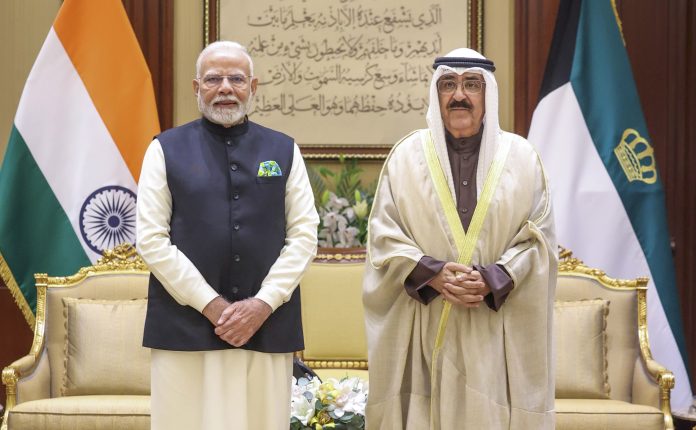Prime Minister Narendra Modi’s visit to Kuwait marks a historic milestone in the Indo-Kuwaiti relationship, as the two nations elevated their ties to a strategic partnership. This development, following extensive talks with Kuwaiti Emir Sheikh Meshal Al-Ahmad Al-Jaber Al-Sabah, reflects the deepening engagement between India and Kuwait across diverse spheres, including trade, technology, and people-to-people connections. The visit also highlights India’s proactive foreign policy in the Gulf region, underpinned by mutual respect, shared interests, and forward-looking collaboration.
The elevation of India-Kuwait ties to a strategic partnership signifies a robust commitment to deepening cooperation in key areas. The two leaders identified critical sectors for collaboration, including information technology, pharmaceuticals, fintech, infrastructure, and security. This comprehensive engagement underscores a shared vision for sustainable development and resilience, particularly as both nations navigate post-pandemic economic recovery and evolving global dynamics. The Indian community, the largest expatriate group in Kuwait, serves as a bridge between the two countries. Their contributions to Kuwait’s development are invaluable. Initiatives that enhance the welfare and integration of expatriates into Kuwait’s economic and social fabric are crucial for sustaining this bond. Conversely, Kuwait’s support during the COVID-19 pandemic, particularly in ensuring the well-being of Indian workers, was a powerful gesture of solidarity. This mutual care and interdependence underscore the depth of the Indo-Kuwaiti relationship. India’s appreciation for Kuwait’s care of over one million Indians residing in the Gulf nation was reciprocated by the Emir’s recognition of the Indian community’s contributions to Kuwait’s growth. This mutual acknowledgement cements the bond between the two countries and sets a strong foundation for future collaboration.
The Gulf region, with its vast energy reserves and strategic location, has always been a pivotal partner for India. Kuwait, in particular, is a vital player in India’s energy security and trade landscape. In the financial year 2023-24, bilateral trade between India and Kuwait reached an impressive USD 10.47 billion, with India’s exports crossing the USD 2 billion mark. Additionally, investments by the Kuwait Investment Authority in India exceeded USD 10 billion, demonstrating Kuwait’s confidence in India’s economic potential. Kuwait is India’s sixth-largest supplier of crude oil, meeting 3% of the country’s energy needs. The strategic partnership aims to diversify this relationship further, exploring renewable energy opportunities and fostering innovation-driven sectors like fintech and pharmaceuticals. Such initiatives align with Kuwait’s ‘Vision 2035’ and India’s ‘Make in India’ and ‘Digital India’ programs, creating a synergy that benefits both nations.
Prime Minister Modi’s receipt of Kuwait’s highest honour, the ‘Order of Mubarak Al-Kabeer,’ during his visit is a significant diplomatic milestone. This knighthood award symbolises Kuwait’s recognition of India’s role as a trusted partner and Modi’s personal contributions to fostering bilateral ties. The accolade reflects India’s growing global stature and its leadership’s commitment to nurturing friendships worldwide. Moreover, Modi’s presence at the opening ceremony of the Arabian Gulf Cup as a ‘Guest of Honour’ highlights the cultural diplomacy that complements economic and strategic cooperation. Such engagements deepen mutual understanding and goodwill, paving the way for enduring partnerships.
The strategic partnership between India and Kuwait opens new avenues for collaboration. Enhanced engagement in sectors like digital technology, renewable energy, and health care can lead to transformative outcomes. Furthermore, the Gulf Cooperation Council, of which Kuwait is a member, offers a broader platform for India to strengthen its ties with the region, given the substantial trade volume of USD 184.46 billion with GCC countries in the financial year 2022-23.
PM Modi’s visit, the first by an Indian leader to Kuwait in 43 years, marks a turning point in bilateral relations. It lays a roadmap for a collaborative future. The elevation to a strategic partnership reflects a shared resolve to adapt to emerging global challenges and harness opportunities for mutual benefit. To sustain the momentum, both nations must focus on institutionalising dialogue mechanisms, fostering public-private partnerships, and encouraging joint ventures. Regular high-level exchanges and people-to-people initiatives can further consolidate the partnership.
Trending Now
E-Paper


